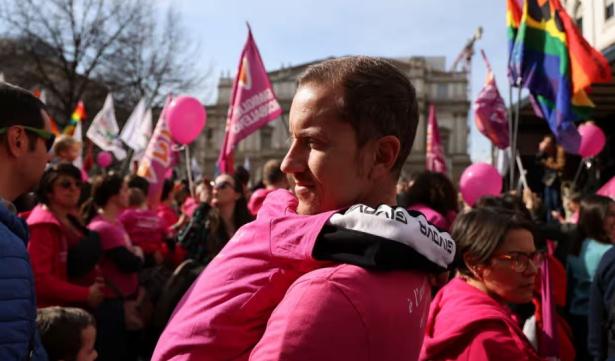Whether
it is school runs or doctors’ visits, Maria Silvia Fiengo and Francesca Pardi have always shared in the raising of their four children. But in recent months – after Italy’s rightwing government began cracking down on the listing of same-sex parents on birth certificates – the life they have forged together has been thrust into uncertainty.
“We’re a bit worried. You never know what is going to happen,” said Fiengo. “Our children have had two parents from the very first moment they were dreamed of and brought into the world. But we’re not protected by any law.”
Following the birth of their children, she and Pardi spent years battling for legal recognition, butting up constantly against the absence of a national law setting out parental rights for same-sex couples. In 2018, the city council of Milan offered up a lifeline, telling them it would begin listing parents of the same gender on their children’s birth certificates.
“It was really beautiful,” said Fiengo. “It gave us strength, our family felt more secure.”
Across the country, a handful of councils were quietly doing the same, transforming the lives of same-sex parents. Their elation, however, was shortlived. This year the Italian government, led by Giorgia Meloni – a hardline traditionalist who has long reiterated her view that a child should only be raised by heterosexual parents – began demanding that councils register only the biological parent.
The mayor of Milan, Giuseppe Sala, said he had little choice but to comply. In the northern city of Padua, the state prosecutor went further, demanding that the 33 birth certificates issued to the children of lesbian couples be changed to remove the name of the non-biological mother. A court is expected to rule on the request later this year.
As rights campaigners warned that the move had plunged hundreds of families in Italy into legal limbo, protests sprung up across Italy and around the world and opposition politicians slammed the move. “These children are being orphaned by decree,” said Alessandro Zan, a gay politician with the Democratic party. “This is a cruel, inhumane decision.”
The European parliament called on the Italian government to reconsider its stance. What was taking place in Milan was a “direct breach of children’s rights” set out by the UN, MEPs noted in an amendment to a 2022 report, and “part of a broader attack against the LGBTQI+ community in Italy”
At issue are the sweeping ramifications of allowing only one parent to be legal, said Angelo Schillaci, a law professor at Rome’s Sapienza University.
“It’s a nightmare for the parents as well as for their children,” he said. “The second of the two fathers or mothers cannot do practically anything, from taking the child to the doctor or picking them up from school, without the authorisation of the legal parent.”
At times even this is not enough. “Even with authorisation, for example, they can’t make healthcare decisions related to saving the child’s life.”
The risks for the family are enormous; if the legal parent dies or becomes seriously ill, the surviving partner has no rights over the children, meaning the children could become wards of the state or handed to other relatives.
While some have cited adoption as a potential workaround, Schillaci described it as a complicated fix that can take years to wind through Italian courts. “What we need is a law that recognises same-sex parenthood,” said Schillaci. “Because right now, the lack of any such law allows for a series of discriminations and violations of children’s rights – it’s appalling.”
The crackdown on same-sex parents has cast a spotlight on Italy’s ranking among the worst countries in western Europe when it comes to LGBTQ+ rights and added to fears that this meagre standing could be eroded under Meloni’s government.
Italy legalised same-sex civil unions in 2016 but stopped short of allowing gay couples the right to adopt amid opposition from rightwing parties and the Catholic church. IVF is banned for homosexual couples in Italy while the Italian parliament recently approved a bill that sets out fines of up to €1m (£855,000) and prison sentences of up to two years for Italians who go abroad to have children via surrogacy.
The government has defended its actions to limit the listing of gay parents on birth certificates, arguing that the move, which echoes a ruling from Italy’s top appeals court, will not prevent children from accessing schooling or medical services through their one legal parent. “There is no discrimination against [these] children,” the family minister, Eugenia Roccella, told parliament in March.
Fiengo described the government’s move as underpinned by ideology. “Otherwise what’s the problem? There are two men and two women who love each other,” she said. “Since Meloni everything has started to become difficult, more difficult than before.”
While she was holding out hope that her children – who range in age from 14 to 21 years – were too old to have their birth certificates revised, she lamented that other same-sex couples would now be denied the same rights.
“Their children aren’t going to be protected as they should be,” she said. “If they were a heterosexual couple, they would be registered. So it’s a question of justice and equality.”
[Ashifa Kassam is the community affairs correspondent for Europe.]


Spread the word